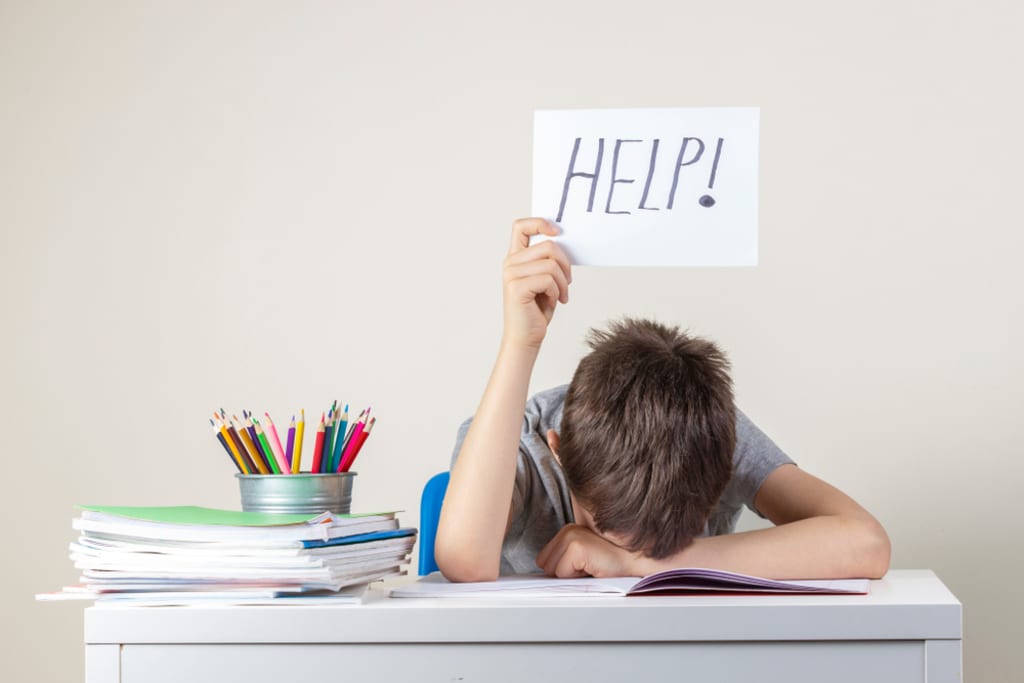Tales from the Dyslexic Side: Part 3
The Dyslexic Student

Reading slowly and missing out on the meaning aren’t the only problems for dyslexics at school. We also try hard, making a huge effort only to end up with a chaotic mess. Even before I was allowed to use pens and let loose with bottles of ink (I still can’t believe they let primary schools kids use fountain pens), my school work was always a mess; my exercise books were a spaghetti junction of crossings out and smudges where some words floated off the lines and others sank beneath them. There was no uniformity of letter size from the beginning to end of a word and the whole thing was a battleground of arrows showing where certain letters had been inserted too late.
As it is for most dyslexics, learning to write was a nightmare. I’m old enough to remember the days of blackboards in classrooms and when I started primary school, there were three of these black slate monstrosities mounted on the wall at the front of the classroom. They sat to the side of the teacher’s desk and we were organised in neat rows so we could see them clearly. Since most things are learned best by doing and what we were doing was learning to write, we spent a lot of our time copying down what was written on those boards. Armed with her piece of chalk, our teacher would start writing in the top left corner of the first board and work her way steadily down and across until all three boards were filled with her neat cursive script. It was then our job to copy what she had written into our exercise book. As I remember this was a fairly regular activity, so after the first few times we all knew the system and knew that in order to finish quickly we had to start copying as soon as possible. Some of us managed this better than others, and others still crawled along at a painfully slow pace. Despite my best efforts, by the time I had worked my way down to the second or third line, I would look across in dismay to find all three boards now covered in tidy little insidious white chalk characters. Sitting there like perfectly formed chains binding me to my desk until I had managed to copy them down or until I ran out of time, which inevitably happened first.
No matter how I tried, those clear straight lines would inexorably get tangled somewhere between my eye and the page. Sooner rather than later I would slip and the start of one line would finish with the end of the one below it. My best efforts at copying would never yield the beautifully formed pages I could see in the books of the children sitting near me. I don’t remember how much time we spent copying those meaningless words down but I do remember the disappointment I felt when I looked at my scribbled page of words which made no sense to me or the teacher.
Thinking back on it, the teacher probably read out loud what she’d written, so we would know how to pronounce the words and she could explain their meanings to us - but that didn’t matter to me. All I wanted was to get those troublesome little characters copied down into my exercise book. I needed to finish before the other children, because only the ones who finished first, the fast finishers (as I now know they are called now) got to do something creative or to build something with Meccano or Lego. Rewards like this were intended to motivate us, to get us to finish our work quickly. And they worked, even on me. It’s possible I learned something back then, but for me, the only thing that mattered was getting everything copied down, legibly or not. I was motivated to learn, the desire was there, the problem was the ability to match the motivation was lacking.
The only thing I took away from those days of learning to write at primary school are memories of struggling to copy down unending sequences of characters into my exercise book. What the words said and if there was ever an actual lesson behind them, I’ll never know.
This type of learning, if it can even be called that, isn’t simply wasted on a dyslexic child, it is an arduous chore more akin to punishment than any attempt to impart knowledge. It was lessons like this that had me placed on remedial tables when I was young, but tables that lacked the proper support for dyslexics. My placement on these tables had me grouped with other students who were unable to study normally (I was one of them, I suppose) was my first introduction to being considered less able. Children are quick to stigmatise others and even quicker to notice when they are being stigmatised. I knew where I was sitting, I was at the slow-kids’ table and I didn’t like it.
That is probably where I would have stayed forever but for two things that saved me. One thing and one person, let’s say. The thing was technology. I’ve had a lifelong love affair with technology. I’ve always loved computers and before them TVs, VCRs, tape players, central heating thermostats, basically anything electric which goes beep and which I can mess around with and find out how it works. When I was ten, I was one of the first kids in my class to complete a simple computer test, despite being one of the only kids to have no access to a computer at home. But that came later. When I was about seven or eight, one of my elder sisters had enrolled on a secretarial course that involved learning to type. I don’t remember that well but I think her interest in being a secretary and learning to type lasted about two weeks. What I do remember is the typewriter the college gave her; it was an oldy-worldly thing of moulded plastic and the colour of dried moss. It was heavy too, not “Misery” heavy but a solid contraption with chunky metal arms that slammed violently out of their home onto the ribbon as your fingers bashed down on the keys. And that’s just what I did, I pounded away on those little plastic keys. I was no child prodigy, I wasn’t writing novels or anything but I was writing the alphabet. I typed it out, again and again, and when I got bored doing that, I did it backwards. I could do it quickly as well.
After a while, my Kerouacian key-bashing caught my mother’s attention and she took the pages to the school. Up until that point, I’d only had a pencil and paper and my own uncoordinated hand and eyes to let me get words and letters down on the page and the result had been somewhat less than spectacular. To me, that typewriter was the mid-eighties equivalent of a computer with spell check. Finally, I could show that I had learned something and, more importantly, that I was capable of learning.
My love of technology sprang from that typewriter, I believe: it captured my imagination as a child and allowed me to demonstrate there was a part of me that could learn and wanted to, it just needed the right tools. Today, programmes like Grammarly and a multitude of other spell checkers allow me to do my job, back then technology liberated me and allowed me to start learning. So I guess one of the things I need to thank is technology and the other is, of course, my mum. She recognised ability in her son when no one else did and found out about dyslexia herself. I can imagine her now marching into the school armed only with a ridiculous sheet of paper bearing nothing more than the alphabet a few times backwards and forwards and a burning desire to make sure her son was given a fair go. But she managed it. She got the school to look beyond my spidery scrawling, bad spelling and poor concentration, and to listen deeper than mispronounced words, to see that there was a child who wanted to learn in there; one that could learn too, if given the right help and support. Someone once said that a person is only disabled if society and the people around fail to recognise it and give the necessary support. As a dyslexic, you need to run faster to keep up, and that’s fine, the extra effort is what creates the best results. It’s trying harder to do what everyone does easily that lets us find new ways to achieve results. We think outside of the box because we didn’t fit inside the box in the first place. We try harder, we just need the world to recognise that we are trying.
That’s just what happened. Not long after my mother’s heroic school intervention at school, I started receiving special reading and spelling lessons. Now that my learning disability had been recognised and I was getting the right help, I was catching up with the other kids. There was also the bonus that the additional support often involved computers, so in a school with just a few computers, I was using almost every day to play things like the Alien Spelling Game. It appeared like I was on the right track and I would be able to keep up at school.
There was just one problem. I was about to start secondary school and the last thing I wanted was to be different. While the extra support I received at school did help, unfortunately, it had a negative effect too. As humans, we tend to focus on the positive and are all too quick to shout success when things start going our way, I am anyway. The fact that I was improving at school made me think I could do it on my own now, that the extra help I was receiving was just that - extra and that I didn’t need it anymore.
As an eleven-year-old about to embark on the great adventure of ‘big school’, I was excited about the opportunity to reinvent myself and it wasn’t something I wanted to do with the stigma of a learning difficulty. As much as individuality and uniqueness help us define who we are, no one ever wants to stand out and be different; and this is true for children as well. I was changing schools and I wanted to fit in and be like everyone else. I didn’t want to start a new school with the label of “being a bad reader” or more probably “a thicky who needs extra lessons” hung over my head. I don’t remember how much I understood about the word dyslexia when I was eleven but I knew enough to realise that I didn’t want to be associated with it, not if it meant being different from everyone else. The extra spelling and handwriting lessons had meant that I started to catch up with the other kids in class and I wanted to leave all of that behind and get on - without any extra attention.
So using whatever techniques and influence I had available to me at age eleven, I tried to make sure that no one at my new school found out about my dyslexia. Somehow, I managed to convince my mother that I didn’t need extra help now. Whether we actually spoke openly about this or if just made post-child, pre-teen scowls at her whenever the topic came up and she took pity on me and understood my desire to fit in, I can’t be sure. For me, dyslexia was something from primary school, it was a childish thing, I was growing up and so I wished to put it away.
About the Creator
Jodie Adam
My advice to you is get married: if you find a good wife you'll be happy; if not, you'll become a philosopher.
- Socrates
www.jodieadam.com






Comments
There are no comments for this story
Be the first to respond and start the conversation.